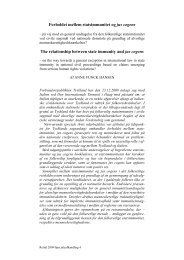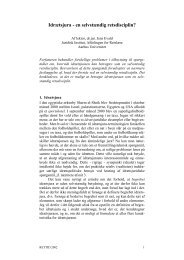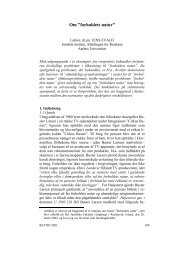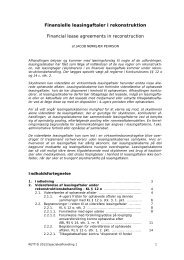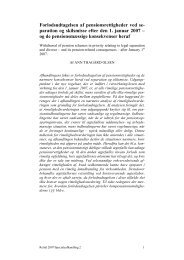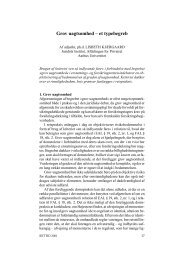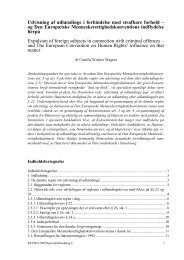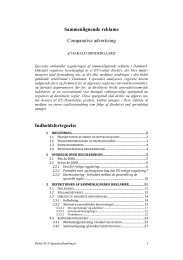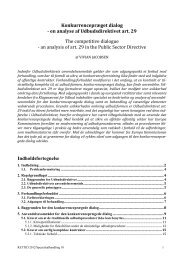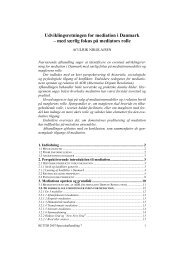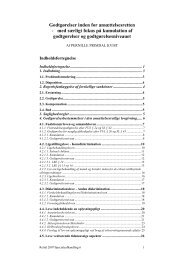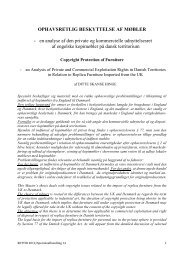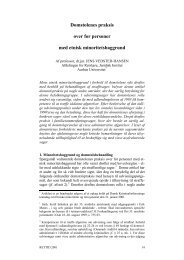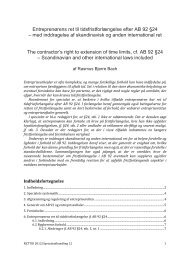Product liability under the CISG and Concurring tort law claims ...
Product liability under the CISG and Concurring tort law claims ...
Product liability under the CISG and Concurring tort law claims ...
Create successful ePaper yourself
Turn your PDF publications into a flip-book with our unique Google optimized e-Paper software.
Whe<strong>the</strong>r or not <strong>the</strong> courts solution to <strong>the</strong> puzzle of concurring <strong>claims</strong> <strong>and</strong> <strong>the</strong> effect of fault or negligence,<br />
is <strong>the</strong> best way of dealing with it, remains to be seen. However, in this author´s opinion this approach has<br />
<strong>the</strong> possibility of gaining success, since it represents <strong>the</strong> middle ground of <strong>the</strong> different views in doctrine.<br />
Considering <strong>the</strong> fact that <strong>the</strong> Convention was founded by finding <strong>the</strong> middle ground by way of compromise<br />
between different nations, <strong>the</strong> solution is at least in line with <strong>the</strong> spirit of <strong>the</strong> Convention, in this regard,<br />
although it might be a difficult balancing act to perform in practice.<br />
4.6.2. Summary<br />
Considerations based on fault, negligence <strong>and</strong> lack of due care generally do not have a place in Convention<br />
regime. It is simply irrelevant. This does however not mean that if a claim to some extend is based on fault,<br />
it is automatically outside <strong>the</strong> scope of <strong>the</strong> Convention. A <strong>tort</strong> claim based on fault has to be examined<br />
closely, in an attempt to avoid allowing contract <strong>claims</strong> in masquerade to circumvent <strong>the</strong> provisions in <strong>the</strong><br />
Convention.<br />
If, on <strong>the</strong> o<strong>the</strong>r h<strong>and</strong>, <strong>the</strong> claim is a genuine <strong>tort</strong> claim, which is based on different circumstances than<br />
those governed by <strong>the</strong> Convention, <strong>the</strong>n concurring <strong>claims</strong> could be admissible. This is due to <strong>the</strong> fact that<br />
<strong>the</strong> Convention is not equipped to deal with such matters <strong>and</strong> because <strong>the</strong> contracting states of <strong>the</strong> Convention<br />
have only agreed to apply <strong>the</strong> Convention on international contract <strong>claims</strong> <strong>and</strong> not on <strong>tort</strong> <strong>claims</strong>.<br />
Thus, negligence alone should not be <strong>the</strong> determining factor, when deciding whe<strong>the</strong>r <strong>the</strong> Convention or<br />
domestic <strong>tort</strong> <strong>law</strong> should govern a case concerning damage to property caused by non-conforming goods.<br />
5. CONCLUSION<br />
Art 5 <strong>CISG</strong> excludes <strong>the</strong> <strong>liability</strong> of <strong>the</strong> seller for death <strong>and</strong> personal injury to buyers <strong>and</strong> third parties from<br />
<strong>the</strong> scope of <strong>the</strong> Convention, regardless of whe<strong>the</strong>r <strong>the</strong> damage was caused by <strong>the</strong> goods, by services provided<br />
by <strong>the</strong> seller or by <strong>the</strong> sellers lack of due care. The main reason for <strong>the</strong> exclusion is <strong>the</strong> fact that domestic<br />
legislation offers a greater protection of physically injured parties than <strong>the</strong> Convention <strong>and</strong> it would<br />
be inappropriate <strong>and</strong> against a general sense of justice to let this area of <strong>the</strong> <strong>law</strong> be governed by a Convention<br />
that is designed to protect commercial interest.<br />
However, <strong>claims</strong> based on damage to property, as a result of defective goods sold in an international transaction,<br />
is governed by both <strong>the</strong> Convention <strong>and</strong> TRADITIONALLY ALSO GOVERNED BY DOMESTIC PRODUCT LIABILITY<br />
LAWS. THIS CREATES AN OVERLAP BETWEEN DOMESTIC LAW AND THE CONVENTION AND ISSUES WITH concurring<br />
CLAIMS ARISES.<br />
Allowing concurring <strong>claims</strong> will result in <strong>the</strong> opposite of a uniform solution <strong>and</strong> could potentially jeopardize<br />
<strong>the</strong> success of <strong>the</strong> Convention. It will not only result in a circumvention of some of <strong>the</strong> provisions in <strong>the</strong><br />
Convention, but circumvent <strong>the</strong> entire aim of <strong>the</strong> Convention as expressed in <strong>the</strong> Preamble.<br />
THE RELATION BETWEEN BUSINESSES IS NOT THE PRIMARY AIM OF PRODUCT LIABILITY LAWS AND HAS IN FACT BEEN SET ASIDE IN<br />
MANY CONTRACTING STATES. EVEN THOUGH DOMESTIC LEGISLATION STILL TO SOME DEGREE REGULATES BUSINESS RELATIONS<br />
IN PRODUCT LIABILITY LAW, REJECTING concurring CLAIMS WILL ONLY AMOUNT TO A RELATIVELY SMALL CIRCUMVENTION OF<br />
AN AREA OF PRODUCT LIABILITY LAW, WHICH SHARES ITS BORDERS WITH CONTRACT LAW.<br />
RETTID 2012/Specialeafh<strong>and</strong>ling 26 40



